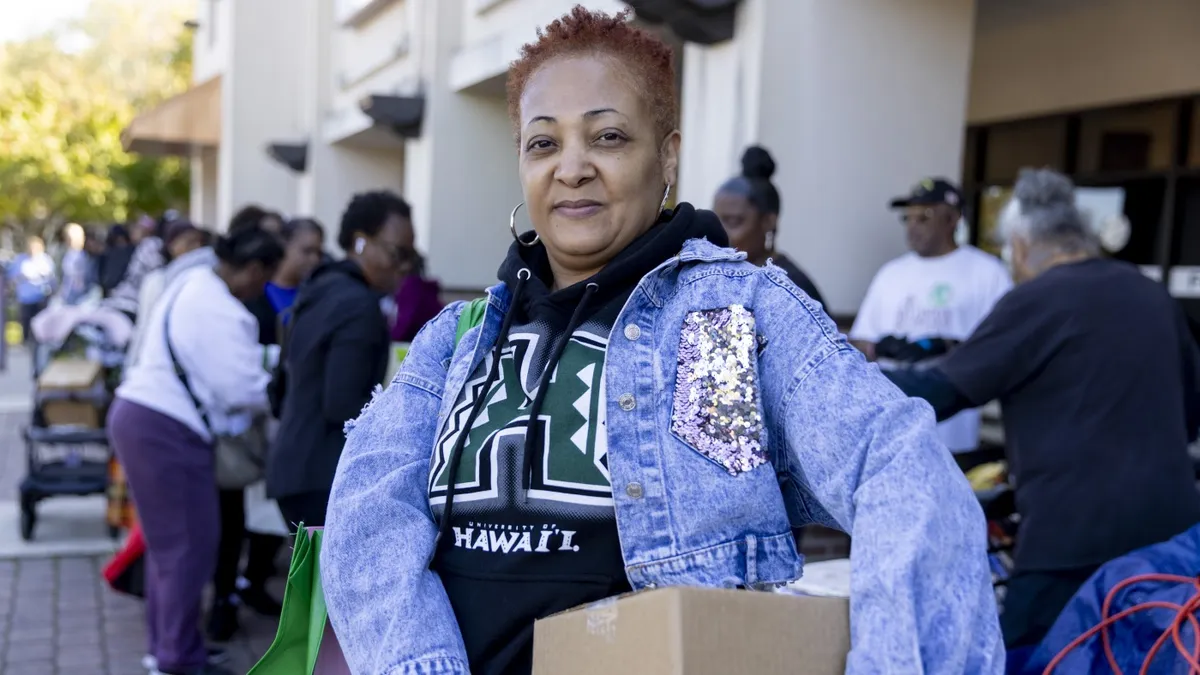
The recent scene in Prince George's County, Maryland was nothing short of staggering. With over 60,000 federal workers residing in the area, middle-class professionals formed long lines to receive essential supplies, including boxes of pasta, protein, and fresh produce to support their families. Wanda Bright, after waiting for nearly two hours, reached the front of the line only to discover that the first batch of supplies had already run out. The Capital Area Food Bank had initially prepared 300 boxes, enough for only 150 government employees to receive two boxes each. However, the demand was significantly higher than anticipated.
Fortunately, reinforcements arrived promptly, and cheers erupted as a second truck pulled into the shopping center parking lot. Bright felt a wave of relief wash over her as volunteers distributed bread and other vital provisions to help her family weather the week ahead. "A lot of us are stressed, and it takes a toll on our mental health," said Bright, representing one of the estimated 700,000 federal workers currently furloughed in the U.S. Many of these individuals are grappling with the reality that Friday, typically a payday, has come and gone without any compensation. They are facing financial uncertainty with no partial pay and no indication of when their paychecks will be reinstated.
As the situation unfolds, approximately 1.4 million civilian federal employees nationwide are currently without pay, according to the Bipartisan Policy Center, a Washington, D.C.-based think tank. Roughly half of these employees are furloughed, while the other half has been classified as essential and continues to work despite the shutdown. For many, this interruption in funding has exacerbated existing financial pressures in an already challenging year.
Jay, a furloughed worker from the National Institutes of Health, expressed his concerns, stating, "This whole fiscal year — 2025 — I was worried about my job and the possibility of being laid off." He described the emotional toll of not receiving paychecks while needing to provide for his family. Jay, who asked to be identified only by his first name to protect his job security, was seen leaving the food distribution site with two boxes of supplies in a stroller, his young children waiting for him at home.
In contrast, Tierra Carter, an employee at the Social Security Administration in Tampa, Florida, continues to report for work, answering calls on the agency's 1-800 number. As a union representative with the American Federation of Government Employees, she shared the difficult choices she has had to make due to the lack of a paycheck, including taking out loans and requesting a hardship withdrawal from her 401(k). "I feel like I'm in a pool, trying to swim to the top, but every time I reach the middle, I'm pushed back down," Carter lamented.
Many federal workers earn less than $90,000 annually, which comprises 43% of the workforce according to an analysis by the Pew Research Center. As bills continue to pile up, some financial institutions, particularly credit unions, have begun offering assistance. For example, the Iowa-based Veridian Credit Union approved over $55,000 in Government Advance Loans for members affected by the shutdown, along with processing no-fee Delay-a-Pays. Other credit unions, such as Westerra Credit Union and Redwood Credit Union, have similarly provided substantial short-term, interest-free loans to their members.
Additionally, the Community Services Agency of the Metropolitan Washington Council, AFL-CIO has been delivering emergency financial support through its Federal Worker Solidarity Fund since February. However, the director, Sig Meilus, reported a surge in requests for assistance with groceries, rent, and utility bills, indicating that the economic strain is growing. "I woke up to 20 new applications for assistance overnight," Meilus noted, emphasizing the alarming trend as the shutdown shows no signs of resolution.
Despite the fact that two-thirds of the civilian federal workforce is still working, the effects of the shutdown are likely to ripple through the economy. Shai Akabas, vice president of economic policy at the Bipartisan Policy Center, explained that while not everyone feels the impact immediately, prolonged disruptions will inevitably affect local businesses and communities. Grocery stores near federal buildings may witness a decline in foot traffic, and daycares could see fewer children as parents face furloughs.
While Congress passed legislation in 2019 to ensure back pay for federal employees post-shutdown, President Trump recently suggested that furloughed workers should not rely on this assurance. "Most of them are going to get back pay, but some of them are being hurt very badly by the Democrats and therefore won't qualify," Trump stated during a recent press briefing.
During the ongoing shutdown, many federal workers continue to receive their salaries as usual. Certain employees, including the majority at the Department of Veterans Affairs, are not funded through the appropriations process that Congress must approve annually. Recently, the Trump administration has employed what Russell Vought, director of the White House's Office of Management and Budget, termed a "budgetary twister" to ensure some federal employees are compensated. Active-duty military personnel received their paychecks on schedule as the Defense Department utilized unspent research and development funds. Similarly, around 70,000 law enforcement officers from the Department of Homeland Security are receiving their pay from funds allocated in Trump's previous tax-and-spending bill.
This discrepancy in pay among federal employees is creating a growing divide as the shutdown continues, leaving many workers in dire financial situations while their colleagues receive compensation.